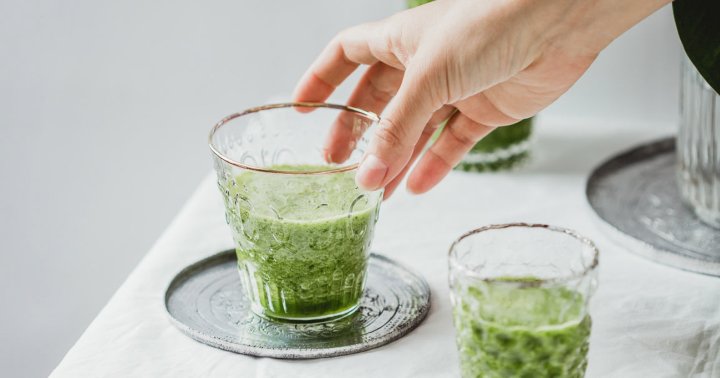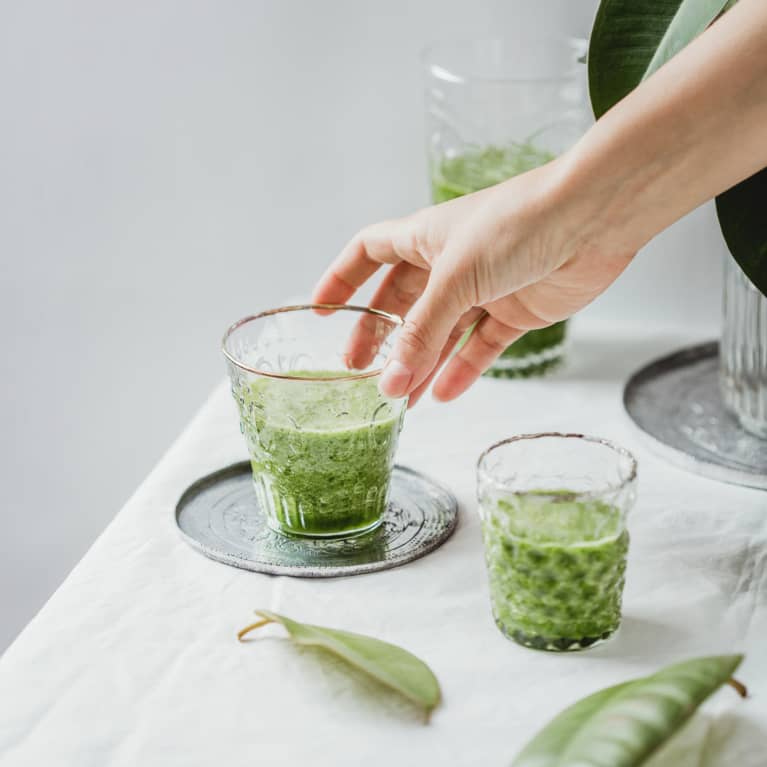Is Green Juice Actually Good For You? Experts Weigh In On The Great Debate
Benefits and drawbacks to consider.


Our editors have independently chosen the products listed on this page. If you purchase something mentioned in this article, we may earn a small commission.
Green juice has become a symbol of a healthy lifestyle, yet juicing is still a hotly debated topic among health and nutrition experts. Some are all about it and others say you should be eating your fruits and vegetables, not drinking them, full stop. We’re not here to dissect each argument, but, when done thoughtfully, green juice can have some serious health benefits.
“Green juice” isn’t a specific type of juice; it’s a broad term that applies to any juice that’s green and/or contains green vegetables. The ingredients don’t all have to be green, but generally the end result is a juice that’s at least green-ish in color.
That being said, there are some green juices that are more beneficial than others. “The healthier juices have more green vegetables and herbs, and less fruit,” says functional nutritionist Luciana Godoi M.S., R.D., LDN. “Essentially, you would want to choose low-sugar juice full of antioxidants.” She recommends spinach, kale, celery, broccoli, and wheatgrass as a starting point.
Leafy greens, which are loaded with vitamins, minerals, and phytonutrients, are essential to maximizing the nutritional value of your green juice. They’re also rich in chlorophyll, the compound that puts the “green” in green juice. Chlorophyll not only gives greens their color, it’s a powerful antioxidant and can help support your body's natural detoxification pathways. The darker the green vegetable, the more chlorophyll it contains.
Spinach is a great choice because it’s high in carotenoids and phytonutrients, according to Godoi. It’s also pretty mild in flavor, so it goes down easily.
Manisha Mittal, M.D., a board-certified integrative medicine doctor, calls out herbs as a great addition, too. Her favorites are parsley, mint, and cilantro.
The specific benefits you’ll get from your green juice depend on what’s in it, but here are some general health perks that apply across the board:
1. A major source of nutrients
Green juice is a concentrated source of vitamins, minerals, antioxidants, and phytochemicals—and because they're already in liquid form (instead of in a whole food matrix), those beneficial nutrients are generally easier to digest and absorb, according to Mittal. Plus you take in more at once. Any celery juice devotee knows that it takes a whole bunch of celery stalks to make about 16 ounces of green juice. And drinking 16 ounces of juice is easy, but 12 celery stalks? Not so much.
2. Supports your gut health
Green juice is also a gut health superstar. “Green juices can provide essential phytonutrients like flavonoids and antioxidants to support microbial diversity and gut health,” says Godoi. “In addition, many studies are now demonstrating the role of phytochemicals like phenolics and carotenoids that can benefit the human gut microbiota.”
Green juices also contain prebiotics, aka fibers that feed the good bacteria in your gut, says Mittel.*
Green juice can help keep you hydrated, especially if it contains high-water content veggies like cucumbers. Cucumbers are 90% water and loaded with electrolytes like magnesium and potassium, which help maintain optimal fluid balance in your cells. (But make sure you’re drinking plenty of water, too.)
Green juice cautions + tips
Let’s be clear, green juice is certainly not a suitable meal replacement; we like to think of it as more supplementary. "Juicing can help us transition into a healthier lifestyle with more intake of green vegetables, but it is not a long-term substitute for a complete meal. It is a stepping stone into a healthier lifestyle,” says Mittal, who doesn’t recommend juice fasting (drinking only juice for an extended period of time), as it can increase oxalates in the body and stress your liver. Instead, consider sipping a green juice alongside a healthy meal—particularly a dish with fiber, to balance out some of the fibers you miss out on while juicing.
Godoi adds that green juice isn’t a cure-all. While you can reap a number of benefits from sipping juice, she explains that many of these perks also come from a combo of lifestyle choices, like ditching less nutritious foods. “Swapping those culprit ingredients for whole food sources such as leafy greens helps supports natural elimination pathways,"* she says.
Our favorite green juice recipes
When it comes to green juice, it’s best to make it fresh. “If the juice is pasteurized and sitting on the shelf it likely loses some of its health benefits,” says Mittal. Her favorite recipe is a combo of kale, cucumber, spinach, ginger, lemon, green apples, and wheatgrass.
Here are some other green juice recipes you can try:
Don't have a juicer? Consider making an alternative to juice that's just as nutritious with mindbodygreen's organic veggies+. All you need for this two-ingredient green juice is a scoop of the organic greens powder and a glass of water. Bonus points: organic veggies+ powder contains vegan digestive enzymes, prebiotic fiber, and probiotic bacteria, which help support healthy digestion.*
The TL;DR? Green juices are an excellent way to maximize your intake and absorption of nutrients. They’re not meant to replace meals, but they can serve as an important adjunct to a healthy diet. The key is to keep the juice low in sugar (to maintain blood sugar balance) by focusing on leafy greens and other green vegetables, like celery, and limiting fruit.

 Aliver
Aliver 
































